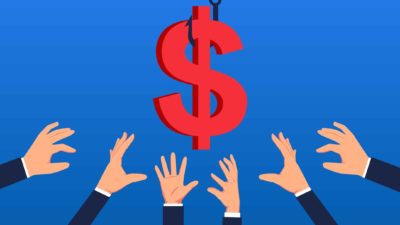Welcome to my Friday article.
On Fridays I do things a little differently. Punchier, format-wise. And sometimes, well, it's just punchy.
Speaking of which…
Who pays the tax if they don't?
Did you see the list, earlier this week of the largest public companies, and the tax they pay.
Or, in almost one-third of cases, the tax they don't pay?
And this isn't a list of companies the ATO has caught doing the wrong thing!
I'm 99.9% sure they're paying every single cent of tax they're obliged to pay.
The problem, then?
The tax laws, themselves.
A company can, for example, use inter-company loans to lower the profit in, say, Australia, while increasing profits in, say, the Cayman Islands, where there's a lower rate of company tax.
Or they can get the accountants to make sure that they make no- or little profit in Australia, instead making those profits in, say, Singapore, where their 'marketing hubs' make all of the money.
And more. And more.
Now, there are legitimate reasons for paying no tax in a given year. Very legitimate. I have no beef with loss-making businesses or those with carry-forward losses.
But if you have the money, the accountants and the interest, it's remarkable how little tax you can pay, especially if you're a multinational.
And if they can (again, legally) pay less tax with a little smoke-and-mirrors, who pays?
Yep.
You and me.
It's been in the government too-hard pile for years, under both sides of politics, where a lack of will, interest or effort has allowed it to go on, and on and on.
Over to you, Treasurer. You have a Budget in structural deficit. This is an obvious solution.
(And, dear reader, if you're not as mad as hell, can I suggest you either haven't seen the story, or you don't understand the scope of this thing. You should be ropeable!)
I'd rather have our problems than theirs
Tuesday was 'Rates Day' here in Australia.
The US upstaged us on Wednesday night with a 0.75% increase in their official interest rate.
Then, the Poms gave us both an almighty 'Hold my beer', as they not only went up 0.75%, but then forecast the UK economy could contract for the next two years.
Make no mistake, things are bleak over there. Thank goodness they had the sense to give former-PM Liz Truss' plans the short shrift, but they still have a lot of work to do.
I'm not saying we should be happy about what's going on here at home, but it could be much, much worse.
Never stop asking our legislators and regulators to be better… but don't forget how lucky we are, at the same time.
Who's that storming down the outside as they reach the winning post?
Our regulators have, shall we say, a variable record of holding Australian companies to account.
But the picture has been brightening in recent months and years.
The Hayne Royal Commission exposed a welter of wrongdoing in our finance sector (though the government squibbed the response!).
The various casino inquiries have gone through those companies like a dose of salts… and then some.
But atop the podium, as far as I'm concerned, is the anti-money-laundering regulator AUSTRAC.
They have been astonishingly good – and thorough – in rooting out wrongdoing.
You really, really, don't want a call from them.
Which is what happened to Sportsbet and Bet365 recently.
To quote an ABC article, AUSTRAC "…told the ABC it has "reasonable grounds to suspect that Sportsbet and Bet365 may have contravened or are contravening the anti-money laundering and counter-terrorism financing law and rules".
That's… not ideal.
But also, it's wonderful.
Our economy and society works best where there are clear rules, well-enforced (and when companies and people can reasonably expect that if they do the wrong thing, they'll be caught.)
We make no allegations of wrongdoing about either company. If there's no case to answer, they should be publicly exonerated.
But it's great to see a regulator really getting stuck into its work. It should be a model for other regulators – whose employees also work bloody hard, to be fair – to follow.
In defence of Facebook
Whoa… what?
Who defends Facebook these days?
It's funny, you know. Once upon a time we hated Microsoft. Then Google (I own shares). Now it's fashionable to hate Facebook.
But don't worry – I'm not going to defend social networks or their algorithms that one the Motley Fool investing team called 'a cancer to society' this week (and isn't wrong!).
But I am going to defend it – and CEO Mark Zuckerberg – against the short-termism of the market.
He's made a big, big call to go neck deep into the so-called Metaverse.
Now, for the record, I think the hype is overdone. We will end up using immersive technology to communicate, but I'm not sure a capital-T 'The Metaverse' is necessarily where we'll end up.
But then again, Zuck is the visionary, not me. He might well be right.
He's certainly spending a large fortune to make it happen.
And, right now, the market hates it. Hates. Despises it.
Facebook's market value has plunged by $1 trillion in the last year or so.
That's gotta hurt.
But is Zuck wrong?
I don't know. And you don't know. And the market doesn't know.
What you're seeing is market impatience at work.
Some CEOs would read the tea leaves and say 'the market hates this, I'll stop'.
But a good CEO – a shareholder-friendly CEO, focussed on building long term value – should ignore the market and push on.
Or, as Amazon (I own shares) founder Jeff Bezos once said:
"When I have a good quarterly conference call with Wall Street, people will stop me and say, 'Congratulations on your quarter,' and I say, 'Thank you,' but what I'm really thinking is that quarter was baked three years ago."
I don't know if Zuckerberg is right. But I do know that this year's results – or the current market sentiment – don't help answer that question.
He should be responsible and thoughtful in capital allocation. Perhaps he has been, perhaps not.
But we won't know if he's right or wrong for years. The recent slump in Facebook's share price has nothing to tell us – or him – in that regard.
Here's my best advice on this topic: If you want a company with steady, predictable results, buy shares in one.
If you buy shares in a business trying to change the world (or even its tiny little corner of the world) don't expect consistency, and be prepared to wait.
Mixing up the two is a recipe for disappointment. And maybe worse.
Quick takes
Overblown: I can't tell you how many times we've been told there's a 'new normal'. In fact, betting against the 'new normal' has been the best bet. Yes, things change. We adapt. Some businesses arrive, some grow, some die. But the fundamental underpinnings of business haven't changed in decades. New categories, a new lick of paint, but the 'old normal' persists.
Underappreciated: Did you know that October was the best month for the Dow Jones Industrial Average in 46 years? Fourty Six! It was barely reported. Or that the ASX gained 6% in October? No-one rang a bell on October 1. Most were worried that inflation would get worse (it did) and that interest rates would go up (they did). The correlation between market returns and the economy is tenuous, at best.
Fascinating: The Melbourne Cup had many fewer free-to-air viewers this year (1.02m) than the year before (1.21m). And that's the continuation of a long term trend (more than 2m people watched in 2015). Maybe they're streaming. Maybe watching in pubs. Or maybe losing interest. I don't know which, but it's worth thinking about whether it's a trend, and what the implications might be.
Where I've been looking: I guess I'm an 'environmentalist' (whatever that means) and I want strong action on Climate Change. But the coal mining companies are incredibly cheap – with one big 'if'. They're cheap if they use the cash flows to create long-term value for shareholders. If I was in charge, I'd be distributing huge dividends and/or investing in less structurally risky businesses. Some are. Others are doubling down. It's a risky area in which to invest, but the rewards for careful stock selection – assuming responsible company management – could be significant.
Quote: "The stock market is filled with individuals who know the price of everything, but the value of nothing." — Phillip Fisher
Fool on!









